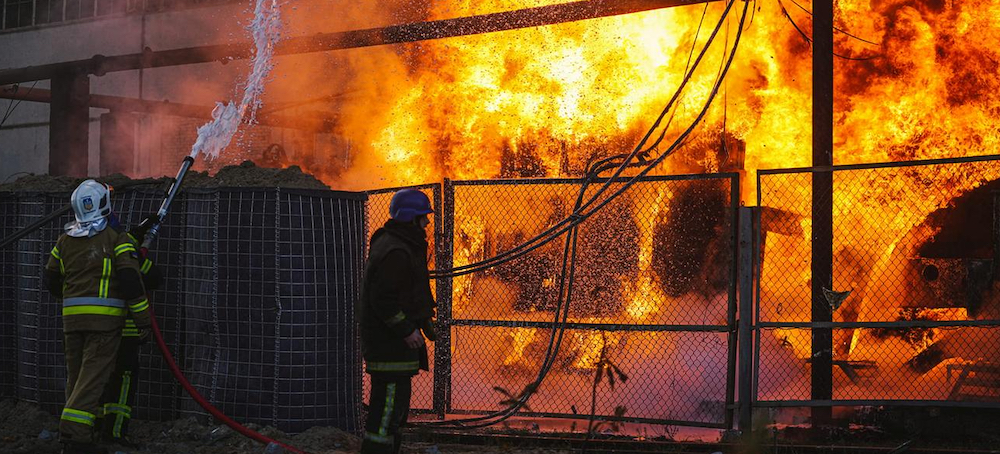Live on the homepage now!
Reader Supported News
Wars are won by deeds—but also by persuasive moral arguments.
President Volodymyr Zelensky, the most inspiring Western war leader since Churchill, knows the power of language. “I need ammunition, not a ride,” will make the history books. His speeches to Congress, the U.K. Parliament, and the Bundestag were outstanding examples of impassioned persuasive speech. But something more is needed from the president and prime ministers of his friends and allies.
The United States and its allies have had a remarkably, perhaps perilously easy time in persuading their people to go along with extensive aid to Ukraine, despite high inflation and energy shortages. To some extent, this is the result of the West’s muscle memory from the Cold War, when Soviet ideology was relentlessly hostile and Soviet internal practice stunningly brutal. Soviet external behavior, from the subjugation of the Baltic states and Eastern Europe to the invasion of Afghanistan, was menacing as well as repellent. And even though the Cold War is more than a generation behind us, when the Russians behave like brutes—“orcs,” as the Ukrainians refer to them—that muscle memory is triggered.
Americans are used to seeing the Russians as the bad guys, and thus our institutions, including the armed forces and the CIA and its foreign counterparts, have a deep repertoire of actions ready in response. The Russians launched an unprovoked war against Ukraine, committed atrocities on a massive scale, and have daily compounded their crimes by attacking civilian infrastructure abroad and brutalizing their own people at home. It is easy (and correct) to conclude that they remain the bad guys today. That we can see the bombed playgrounds and hospitals and the tortured bodies of their victims on Twitter makes it so much easier to mobilize against them.
The tests are coming, however, particularly if Europe has a cold winter that makes Russian cutoffs of energy supplies bite. In the United States, the likely next speaker of the House of Representatives, Kevin McCarthy, in a gesture to the neo-isolationist wing of the Republican Party, has indicated that it is time to curtail aid to Ukraine. The motley collection of so-called realists (who think that Russia’s crimes are irrelevant), isolationists, admirers or tools of Russia, and America-Firsters have kept up a running if muted line of criticism, not so much of the Zelensky government as of the American burden in supporting him.
McCarthy’s views have nothing to do with principle, because he has none. Rather, he is a weather vane, acutely sensitive to the winds that blow from Mar-a-Lago and the wing of his party that has always resented America’s presence in the outside world. The isolationist and even xenophobic traditions of one faction in the Republican Party run deep. Suppressing them for the past several generations was the great achievement of politicians like Dwight D. Eisenhower and intellectuals like William F. Buckley. But they are back and need to be addressed, as do comparable movements on the left of the Democratic Party.
Even more important, average Americans, properly worried about inflation, recession, and a bitterly divided political class, need to hear why it is important to weigh in, wholeheartedly and with vigor, on Kyiv’s side.
Two kinds of words are needed: those explaining why the fight for Ukraine is important to American security and welfare, and those making the case on moral grounds. No American policy can succeed in the long run without addressing both our interests and our values. When the two coincide, as they did during World War II and the Cold War, the United States can show remarkable perseverance. When they diverge or are weak, as became the case in America’s interventions in Afghanistan and the Middle East, policies collapse.
A good speech on Ukraine will not invoke the phrase “rules-based international order,” which might resonate in a freshman introduction to international relations, but not with an audience of normal people. Rather, Americans and Europeans need to hear about the consequences if Russia were to crush Ukraine; about the invasions and depredations that would surely come next in the Baltic states, and quite likely beyond; about the conclusions a no less ruthless Chinese government would draw; and about how a failure to take a stand here would mean something much bigger and more dangerous in a few years’ time. They need to hear how staunchness now, even in the face of nuclear threats, is infinitely better than a large-scale, possibly global war in a decade. They need to hear that world war is not just the stuff of history books or their grandparents’ or great-grandparents’ lives, but a possibility for us if we are not prudent now.
They also need to hear about the semi-genocidal nature of the Russian attack on Ukraine—not just the extensive torture, murder, and rape of the civilian population, but the kidnapping of thousands of children, and the attempt to wipe out Ukrainian language and culture.
Americans also need to hear a celebration not only of Ukrainian courage and tenacity, but of their skill. On January 20, 1940, Churchill gave a speech in which, among other things, he reflected on Finland’s astonishing early defeats of the Soviet armies that had attacked it a few months before.
Only Finland—superb, nay sublime—in the jaws of peril—Finland shows what free men can do.
And he issued a warning:
If the light of freedom which still burns so brightly in the frozen North should be finally quenched, it might well herald a return to the Dark Ages, when every vestige of human progress during two thousand years would be engulfed.
Now is a moment for Churchillian rhetoric and insight, suitably modified to the limitations of those who may share his instincts but lack his brilliance.
Modern politicians very rarely speak this way, but they need to try, and they will be heard if they do so. They do not have to reach Churchillian heights. The opposition to aid to Ukraine is still divided, hampered by its own crankiness and embittered introversion, and undermined daily by Russian barbarity, and no less, the astonishing Julius Streicher–like candor with which its propagandists howl for the blood of innocents.
Ukraine’s struggle for freedom and for its very existence is the struggle of a much larger order, not just in Europe but globally, and indeed of the human spirit. It needs to be understood not only in the somnolent rhythms of bureaucratic choice or academic analysis, but in language that sings. The situation calls for sound policy, no doubt; it also calls for eloquence that soars. There is an epic speech to be delivered here; let us hope that there is someone who can deliver it.
 More than a million households in Ukraine were left without electricity following Russian strikes on energy facilities across the country. (photo: Reuters)
More than a million households in Ukraine were left without electricity following Russian strikes on energy facilities across the country. (photo: Reuters)
ALSO SEE: Ukrainian Forces Advance Against Russian Fighters
in Kherson and Bakhmut
Since Oct. 10, Russia launched over 300 strikes on Ukraine's power stations, destroying around a third of the country’s energy-generating capacity. Russia openly admits that Ukraine's energy infrastructure is among its key targets.
President Volodymyr Zelensky urged citizens to cut their electricity usage starting Oct. 20.
Ukraine's national energy company Ukrenergo announced that the company would be shutting down power across the country for several hours daily to maintain the country's energy system afloat.
The attacks have little to do with military logic, but seek to inflict humanitarian catastrophe by hindering civilians’ access to electricity and heat, according to Kirill Mikhailov, an expert with the Conflict Intelligence Team, a Russian investigative project.
"(Russian President Vladimir) Putin believes that this will make Ukraine surrender," Mikhailov told the Kyiv Independent.
Intensifying attacks
Russia's new wave of military escalation began on Oct. 10, when it launched widespread missile attacks across the country that hit power facilities in Kyiv and other major cities, such as Lviv in the west and Kryvyi Rih in the southeast.
Among the sites that continue to be targeted is Burshtyn thermal power plant in Ivano-Frankivsk Oblast. It is one of several sites in western Ukraine that produce electricity exported to Europe.
Ivano-Frankivsk Oblast Governor Svitlana Onyshchuk said electricity production sharply declined after the attack.
The Oct. 10 attack forced Ukraine to stop exporting energy to Europe immediately. The export hasn’t been restarted yet.
The National Police said that 29 critical infrastructure facilities, including power stations, were hit. Since then, power outages across Ukraine have become a new reality.
Mass power outages were reported in Lviv Oblast, leaving some 1.5 million people without electricity after hitting two substations in and near the regional capital. The same facilities were struck the next day again, inflicting further damage.
In mid-October, Kyiv also started experiencing its first-ever sporadic blackouts since the full-scale war began in February.
Political and energy experts the Kyiv Independent spoke to agreed that the Oct. 10 large-scale coordinated attack was planned well in advance, while the plan to destroy Ukraine's energy infrastructure was well planned.
Andrian Prokip, a Kyiv-based energy expert with the Kennan Institute, said that since Ukraine's energy infrastructure was designed during Soviet rule, the Kremlin must hold all necessary plans and documentation.
Prokip says Russia knows where to hit. He added that Russia's likely aim was to roll a nationwide blackout to frighten Ukrainians.
Theoretically, a nationwide blackout remains a possibility if Russia can hit a "critical number of some specific and important facilities" while inflicting the right amount of damage, Prokip said.
Prokip explained that a lack of electricity means that all other utilities will cease to work, including centralized water supplies and centralized heating.
"This may mean the country will go dark," but it would depend on whether Russia has enough capacity to strike energy equipment across Ukraine and how well Ukrainian air defense would perform, he added.
"This would be very difficult," he told the Kyiv Independent.
However, in an interview with Ekonomichna Pravda, the CEO of Ukraine’s largest private energy company DTEK Maxim Timchenko said that a nationwide blackout is improbable, given how Ukraine’s energy systems have withstood Russian attacks so far.
He said during the same interview that Ukraine’s energy system is built like a loop, so another part picks it up if one part suddenly stops working.
Political game
It's not a coincidence that Russia intensified its attacks after Ukraine's successful counteroffensive in the country's east and south that turned the tide of the war.
Kyiv-based political scientist Oleh Saakian said Kremlin propagandists have been calling for attacks on Ukraine's critical infrastructure since late July. This was when Russia's military progress was stalled for a few weeks after it had captured Luhansk Oblast.
Saakian believes that Russia purposefully decreased the intensity of the strikes before Oct. 10 to stock up on missiles to prepare for an escalation. He thinks that Moscow meant to start the campaign later when the weather is colder, but it was forced to change plans due to the blast at the Crimean Bridge, connecting occupied Crimea with Russia, on Oct. 8.
The Kremlin accuses Ukraine of blowing up the bridge. Ukraine has officially denied involvement. "We definitely did not order that, as far as I know," Zelensky said.
Dealing with an embarrassing blow, Russia had to show that it could still inflict serious damages on Ukraine in order to raise support for the war domestically, Saakian said.
"(These are) instruments of terror," Saakian told the Kyiv Independent.
Energy facilities destroyed
The recent attacks target the power grid, substations, and thermal and nuclear power plants.
In addition to that, a lot of critical infrastructure in the occupied territories has been destroyed during fighting. In the recently liberated areas, repairs of energy facilities are often difficult or impossible due to Russia’s heavy shelling.
Most liberated towns and villages were cut off from electricity, gas, and water supply for months.
Energy expert Hennady Riabtsev told the Kyiv Independent that the full restoration of energy facilities could occur only after the war.
For now, the energy flow in Ukraine depends on how well Ukrainian forces can shoot down targets and how much further they can advance on the battlefield, he added.
The most vulnerable part of the energy infrastructure is compressor stations, which are needed to channel natural gas to households, according to Riabtsev.
"This heating season will be the most difficult in the modern history of Ukraine," Riabtsev said.
The head of DTEK Timchenko told the Kyiv Independent that some measures are being taken to protect its energy facilities, such as building cement blocks around them and working closely with the military.
Timchenko added that DTEK suffered over $8 million in damages to power stations between Oct. 10-12.
He added he couldn't calculate how much DTEK had lost since the start of the full-scale invasion. Regarding DTEK's property in occupied territories, Timchenko said he doesn't know what is happening to them and how damaged they are.
Meanwhile, in early March, Russian forces captured Europe's biggest nuclear power plant in Ukraine's southeast. The occupied Zaporizhzhia Nuclear Power Plant (ZNPP) used to make up one-fifth of Ukraine's electricity.
Ukraine has begun relying more on renewable energy in recent years, but electricity generators such as wind turbines are located in the occupied parts of Zaporizhzhia Oblast due to its proximity to the sea.
Scheduled blackouts
While Russia has hit some energy facilities earlier, Ukrainians started feeling that the country’s energy resource was dwindling only after the October attacks.
Authorities urged citizens all across the country to minimize their electricity consumption between 7 a.m. and 11 p.m.
The state energy company Ukrenergo told Ukrainians to check with the regional distributor to see when their area will be cut off from electricity. In Kyiv, DTEK has started cutting buildings’ off electricity for four hours a day. The company has published a schedule of planned outages for every street.
"We do not exclude that with the onset of cold weather, we will be asking for your help (to use less electricity) even more frequently," Ukrenergo said on Telegram.
Ukrainian officials had warned that Russian attacks on Ukraine's energy facilities would only continue going forward.
Energy experts agree that Ukraine's energy sector has proven to be sturdy, with repairs quickly being done to resume the flow of electricity. Still, only reliable air defense can ensure that Ukrainians will have heat and electricity during winter.
Follow us on facebook and twitter!
PO Box 2043 / Citrus Heights, CA 95611






